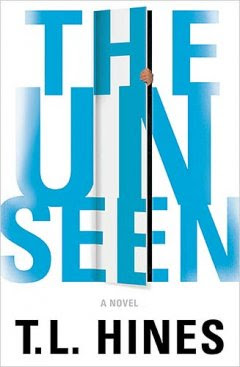 Thomas Nelson Publishers, 2008
Thomas Nelson Publishers, 2008
- 3 of 5 Lions
- I recommend it for ages 14 and up
- I believe men will enjoy the book more than women 4:1
T. L. Hines writes the most creative tweets on Twitter. (http://www.twitter.com/tlhines) My favorites include:
- Holding out for a Red Ryder BB gun. Have an extra eye to spare.
- Wishing Halle Berry would reconcile with her estranged sisters Huckel and Razz.
- Joe the Plumber has inspired a lot of cracks these last several days. Which is kind of fitting, when you think about it.
- Is age 72, in Chinese Gymnast Years.
- Dinner tonight: liver, fava beans, and a nice Chianti.
After more than four-dozen chuckles and groans reading his tweets, I took a chance reading his latest novel, The Unseen from Thomas Nelson Publishers. A potential tag line could be: Little Brother is Watching You … and Taking Notes.
Hines creates a fascinating hidden universe. He tells the story of Lucas, a young man with a remarkable talent: being able to get into any space to watch others. Lucas witnesses something that sucks him through his peephole into the action. His life depends on what he sees and remembers.
John Watson, associate professor of journalism at American University in Washington, commented on our culture’s love of horror films, “We like being frightened without being in actual peril.” Others have called America a “Voyeur Culture” because we spend more time watching others live “reality” lives on TV than we do building relationships with our families or neighbors. Hines brings the voyeur culture into your home and office with The Unseen. You’ll never think about acoustic ceiling tiles the same way again. You’ll walk around your house looking at the nooks and crannies wondering, “Could anyone fit in there?”
Fans of Dean Koontz will enjoy Hines’ story.
The first two acts of The Unseen are riveting reading. The characters are genuine. The places and situations are painted with the careful brushstrokes of an artful storyteller.
By this point in my reading experience, I cared about Lucas and Leila. I had to know what happened to them. But the rest of the book felt a lot like “Hancock” or “The Long Kiss Goodnight.” Both movies took twists that made the audiences laugh, but not at the comic relief. They laughed at the implausibility of the rest of the story.
It’s hard to keep up with the body count—and who’s doing the shooting—in the second half of The Unseen. Most of the killings, including the offing of two police officers, seem convenient. They shoot and kill with little concern for the consequences or the morality of their actions. Everything is expedient. Perhaps that’s how it really is in our intelligence community.
In Hines’ acknowledgments, he notes that he battled and beat cancer during the creation of this, his third novel. I’m grateful that he beat cancer because I look forward to reading more from this talented author.

Recent Comments